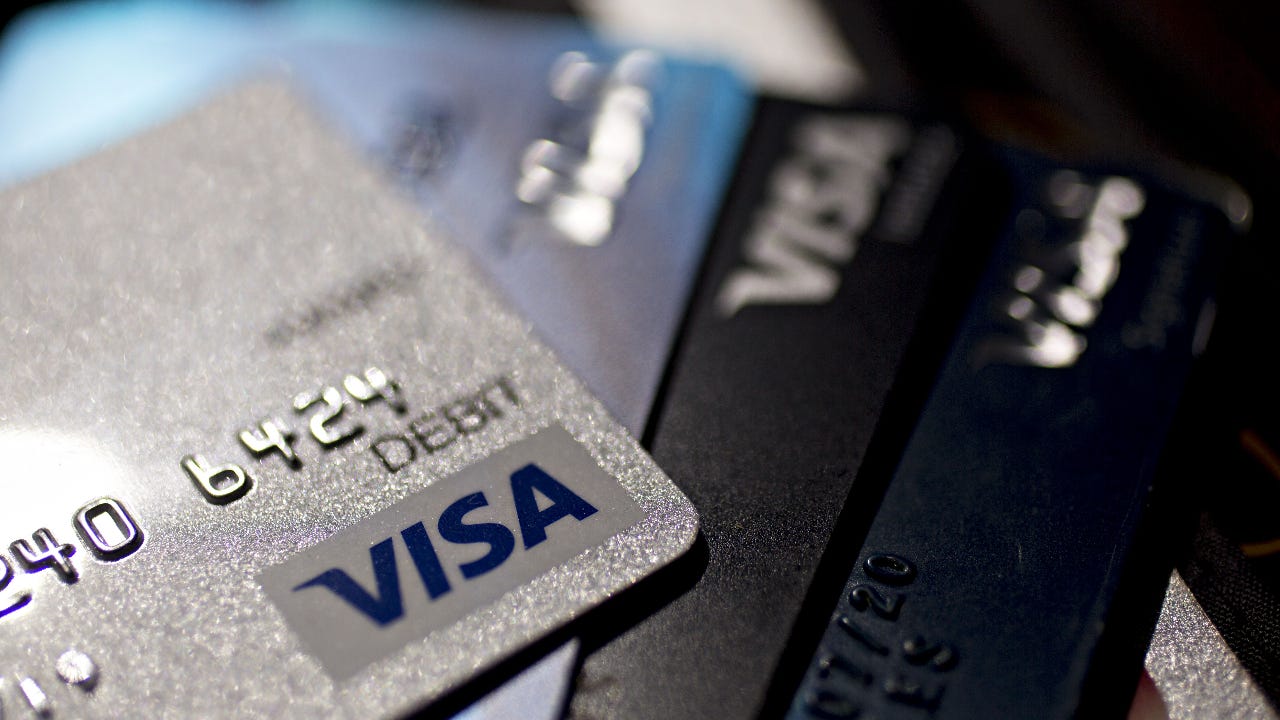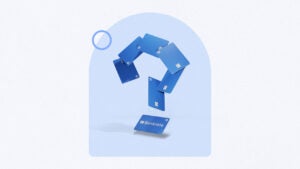What is a Visa card?

Key takeaways
- Visa is a payment network that processes 61% of transactions in the U.S.
- Visa serves as a communication line between merchants and your bank to process payments.
- Visa and Mastercard offer different benefits for cardholders, with Visa focusing on travel and protection and Mastercard focusing on discounts and promotions.
- Consider both the payment network and credit card issuer when choosing a credit card.
No doubt you’ve seen the Visa logo on a credit or debit card before — but what exactly is a Visa card, and how does it compare to Mastercard? Does it matter which one you choose when deciding on a credit card?
We’ll take a closer look at Visa, how it compares with Mastercard and common credit card terms that are helpful to know if you’re getting started with credit cards.
What is Visa?
Put simply, Visa is a payment network. When you buy something with a Visa card, Visa processes the payment, instantly communicating with your bank so the merchant gets paid. This happens whenever you swipe your card, regardless of whether you’re shopping in person, or on your laptop, tablet or cellphone.
Mastercard, American Express and Discover are also payment networks, but Visa and Mastercard are the most widely accepted networks. In fact, Visa processes 61% of transactions in the U.S., far outpacing any other network.
What is the history of Visa?
Visa’s operations began in 1958 when Bank of America launched the BankAmericard® credit card. It was the first consumer credit card program, and it brought the company great success, allowing it to expand operations internationally in 1974. In 1976, BankAmericard became Visa — a name that sounded the same in all languages.
Visa continued to grow as regional businesses around the world merged to form Visa, Inc. in 2007. A year later, it went public in one of the biggest initial public offerings (IPO) in history. Today, Visa operates in more than 200 countries and territories, with the mission to “uplift everyone, everywhere by being the best way to pay and be paid.”
Of course, those who are shopping for a credit card often prefer one that’s widely accepted. The more Visa dominates the global payment network industry, the more it attracts new merchants and, by extension, customers.
How does a payment network differ from a card issuer?
Despite Visa’s popularity, there’s often confusion around what a Visa card’s role is when it comes to credit card benefits.
American Express and Discover, for example, serve as both the payment network and credit card issuer. However, unlike American Express and Discover, Visa does not issue credit cards. It is solely a payment network.
Instead, financial institutions, such as Chase, Capital One and Wells Fargo, issue credit cards — and Visa serves as the communication line that allows payment transactions to be processed.
Keep in mind: A credit card issuer, not the payment network, administers rewards programs and credit card perks, and determines borrowing terms like interest rates and fees.
Visa vs. Mastercard
In practice, Mastercard is almost as widely accepted as Visa worldwide. But both payment networks offer additional benefits to credit card members just for being a part of their network, and that’s how Visa and Mastercard differ.
Generally, Visa’s benefits are more focused on travel and protection, while Mastercard focuses more on discounts and promotions.
Visa benefits
Visa offers three main tiers of benefits: Traditional, Signature and Infinite.
- Traditional: Includes zero fraud liability, emergency card replacement and cash disbursement and emergency roadside service.
- Signature: Includes all of the Traditional benefits, plus 24-hour travel and emergency assistance.
- Infinite: Includes all the other tier benefits, as well as travel accident protection, trip cancellation and interruption protection, trip delay reimbursement, lost luggage coverage (up to $3,000 per trip or $2,000 per bag if you live in New York), an auto rental collision damage waiver, return protections and purchase protections.
Mastercard benefits
Mastercard also offers three main tiers of benefits: Standard, World and World Elite.
- Standard: Includes emergency card assistance and replacement, zero fraud liability and identity theft protection.
- World: Includes Standard benefits, plus trip planning, travel upgrades, concierge service and numerous discounts and promotions.
- World Elite: Includes all the previous benefits, along with exclusive offers and more discounts and promotions. Current promotions are the same as the World promotions, plus access to exclusive PGA Tour experiences and VIP travel experiences (like cooking classes abroad, tours or personal shopping services).
Types of Visa cards
Visa cards — those branded with the Visa logo that use the Visa processing network — come in a few different versions:
- Debit cards: These are usually linked to a checking account and issued by your bank. When you swipe it at the point of sale, the money instantly comes out of your account.
- Credit cards: Banks also issue credit cards, and they typically come with many more consumer benefits and protections, such as zero fraud liability and transaction monitoring. Others come with extra perks like rewards and purchase protections. They also have an APR for carrying a balance, which is the cost of borrowing from your credit line.
- Prepaid cards: Just like it sounds, prepaid cards must be loaded with funds before you can use them. You can control how much is on the card at a given time, so it’s ideal for monitoring transactions.
- Gift cards: These are gifts that work much like prepaid cards. The main difference is that you can’t reload a gift card. Once it’s spent, that’s it.
The bottom line
Visa is one of the largest and most recognized payment networks in the world, making it a reliable network if worldwide acceptance is important to you. But keep in mind, Visa doesn’t administer rewards programs, dictate interest rates or set credit card fees — your credit card issuer handles that.
When choosing a credit card, it’s critical to consider these aspects of what a card issuer offers so you’re sure to get a card that meets your needs.
Why we ask for feedback Your feedback helps us improve our content and services. It takes less than a minute to complete.
Your responses are anonymous and will only be used for improving our website.






